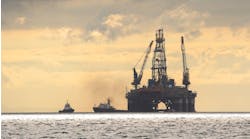By Ariana Hurtado
HOUSTON — Industry leaders, session presenters and exhibitors shared their insights about the future of the offshore sector, the energy transition, technology and more at the Offshore Technology Conference (OTC) this week. The following quotes were gathered by while attending presentations and networking on the show floor.
MONDAY:
GoM energy transition:
"The Gulf of Mexico [GoM] business is an essential driver of bp’s transformation from an international oil company to an integrated energy company. Not only are emissions reductions here essential to helping us achieve our net-zero ambition; the cash flows from our oil and gas production will allow us to invest in the energy transition while continuing to grow this business. Bringing online Argos, our fifth hub [in the GoM], by the end of the year will be key to this growth."
—Starlee Sykes, senior vice president of GoM and Canada, bp
Read the article detailing her keynote session at: OTC 2022: bp keynote focuses on hydrocarbon resiliency and new technology
Future of offshore energy:
“Offshore energy production is essential for the energy and national security of our nation and that of our allies. Every day, the energy services and technology sector is innovating, developing and implementing new technologies that lead to cleaner, more efficient energy production. As we continue to look to expand domestic production, we need a level regulatory playing field, a resumption of offshore lease sales, increased investment opportunities and a stop to the negative rhetoric about the industry. I’m optimistic about the future of offshore development and believe our workforce will make it a success.”
—Leslie Beyer, CEO, Energy Workforce and Technology Council
TUESDAY:
Workforce development:
“Educating about the opportunity in this industry is important because there are misperceptions, and it has to compete for talent with other industries. As there is ongoing digitalization and decarbonization across the value chain, there are many new work streams from mathematicians, statisticians, data analytics, design engineers and environmental advisers. 40% of HR leaders don’t know what skills their workforce possesses—and just 34% are investing in workforce learning and reskilling as part of their future of work strategy. The need of the hour is to build a skills-based organization, which uses skills as the fuel for a wide range of talent and business decisions.”
—Amy Chronis, vice chair, oil, gas and chemicals leader and Houston managing partner, Deloitte LLP
Leveraging data:
“The industry must move away from a private, individual and DIY data mindset to a shared, collaborative and open-source approach. Companies must focus on leveraging their data for insight generation and data-supported decision-making, not on data storage, data architecture and data wrangling.”
—Carolina Torres, executive director of energy industry transformation, Cognite
New tech:
“The MS2 features are based on full utilization of smart technology solutions for our offshore customers. The MS wellhead guarantees seal installation at full capacity and guarantees full lockdown capacity. Working with our customers, we have developed a wellhead solution that goes beyond API qualification in the offshore industry—a very proud development giving our customers increased operational and installation enhancements.”
—Romain Chambault, vice president of services and offshore, oilfield equipment, Baker Hughes
View the news release at: OTC 2022: Baker launches new subsea wellhead technology | Offshore (offshore-mag.com)
WEDNESDAY:
Role of deep water:
“Much of the world’s remaining oil and gas reserves are located in deep water. There have been several notable discoveries in the recent past, and deep water continues to attract significant interest, particularly from international oil and gas companies. …They regard this as an important part of the future global energy mix.”
—Hani Elshahawi, managing director, NoviDigiTech
FLNG and the energy transition:
“So how can FLNG be a solution for reducing the CO2 footprint of the energy industry? The first step is to reduce the CO2 that you actually emit during the construction. Megamodule is a way to reduce CO2, not only to reduce the capex and the costs, but actually the concept of the design of the topside into fewer two or three larger and heavier modules, as opposed to the conventional topside module to do the same function. We offer larger modules, which would integrate similar functionalities, and that would actually reduce the footprint of the FLNG itself, so we could improve intensification of the plant.”
—Lorenzo Disaro, business development manager FLNG, Technip Energies
Read the article detailing his FLNG discussion at: OTC 2022: Technip Energies shares how FLNG applies to energy transition
THURSDAY:
Offshore development:
“The world clearly has an imperative to reduce carbon and methane emissions. Through the energy transition, oil and gas will continue to be an important part of the energy mix in order to sustain growing demand. Offshore development continues to offer a secure and reliable source of energy with a lower relative carbon intensity. The technological and project management capabilities of those involved in the offshore energy sector, which solved some of the most complex engineering challenges of our time, are well positioned to lead innovation in solutions such as carbon capture and storage.”
—Paul Leonard, president of Operations Americas, Wood Plc
Adoption of digital technologies:
“Today the offshore industry is moving toward integrated energy systems that combine traditional and decarbonized energy streams. This is both a necessary and a pivotal move for the industry, but it requires a mindset shift away from the conventional approach of only producing hydrocarbons. To accelerate this, the industry will need to collaborate and accelerate the adoption of digital and new technologies. The result will be enhanced performance and a reduction in carbon footprint.”
—Reda Bouamra, production systems marketing and strategy manager offshore, Schlumberger




